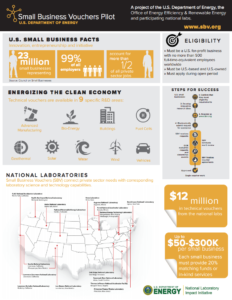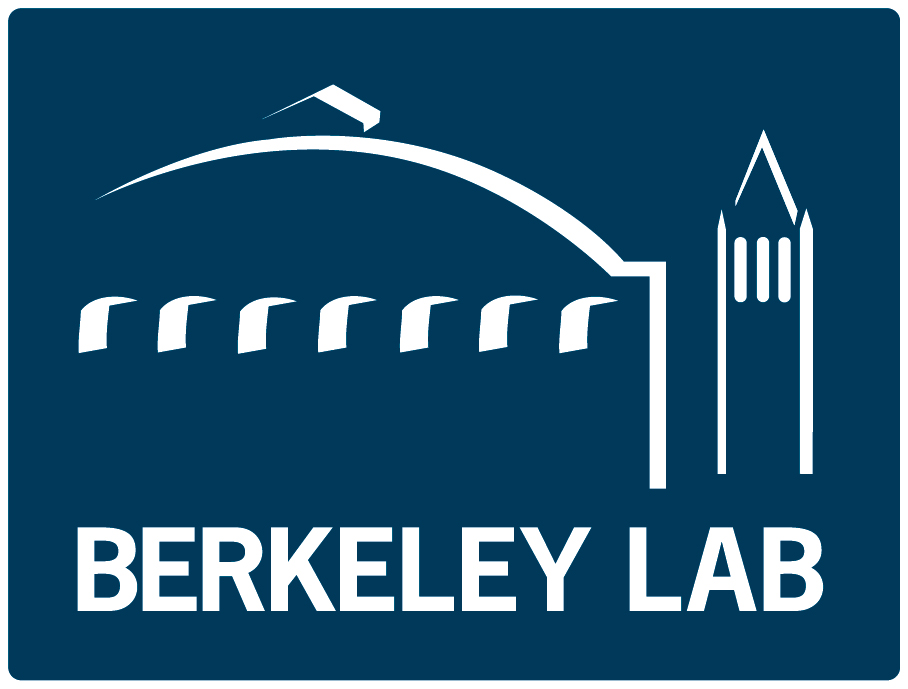

Berkeley Lab is helping to energize the clean energy economy as a participating lab in the U.S. Department of Energy’s (DOE) Small Business Vouchers Pilot. The Small Business Vouchers pilot helps small business innovators connect and establish funded partnerships with renowned researchers, facilities, and expertise at DOE National Laboratories. The Small Business Vouchers pilot provides clean energy small businesses with vouchers valued from $50,000 to $300,000 that can be used for technical expertise, facilities or software at national laboratories.
Application period is closed.
Get Updates
Learn more about the internationally acclaimed expertise and facilities at Berkeley Lab. We look forward to helping clean energy small business overcome technology and commercialization challenges. Subscribe to Small Business Voucher Pilot Updates and stay up-to-date on informational meetings, upcoming events, and other announcements from the SBV team. For more information about the Small Business Voucher Pilot and working with Berkeley Lab, contact sbv@lbl.gov.
Small Business Awardees – Round 1
In Round 1, 33 vouchers were awarded in 9 technology areas for a total of $6.7M. Berkeley Lab is partnering with small businesses on 4 of these projects.
Building Technologies
 Lucid Design Group is partnering with Berkeley Lab’s experts in physics-based tools to integrate a range of datasets into an energy efficiency tool that will provide diagnostic insights into buildings that typically suffer from patchy analytical data.
Lucid Design Group is partnering with Berkeley Lab’s experts in physics-based tools to integrate a range of datasets into an energy efficiency tool that will provide diagnostic insights into buildings that typically suffer from patchy analytical data.
Oakland, California
Voucher Award: $200,000
Bioenergy Technologies
 Lygos, Inc. is seeking to overcome challenges in scaling up their biological-based process that produces malonic acid and will use the Advanced Biofuels Process Demonstration Unit (ABPDU), a new manufacturing demonstration facility at Berkeley Lab, to conduct the necessary testing to overcome current barriers. Biomass sugar-derived process is cost-effective, and makes large-scale manufacturing possible as this technology moves forward with commercialization.
Lygos, Inc. is seeking to overcome challenges in scaling up their biological-based process that produces malonic acid and will use the Advanced Biofuels Process Demonstration Unit (ABPDU), a new manufacturing demonstration facility at Berkeley Lab, to conduct the necessary testing to overcome current barriers. Biomass sugar-derived process is cost-effective, and makes large-scale manufacturing possible as this technology moves forward with commercialization.
Emeryville, California
Voucher Award: $300,000
Vehicle Technologies
 XG Sciences, Inc. has developed advanced materials for lithium-ion batteries and will partner with Berkeley Lab to perform investigations to optimize and improve performance of their silicon/graphene composite anode materials to help enhance next generation high-energy Li-ion batteries.
XG Sciences, Inc. has developed advanced materials for lithium-ion batteries and will partner with Berkeley Lab to perform investigations to optimize and improve performance of their silicon/graphene composite anode materials to help enhance next generation high-energy Li-ion batteries.
Lansing, Michigan
Voucher Award: $150,000
Envia Systems will use Berkeley Lab’s research facilities and advanced imaging techniques to better understand the material structures of silicon-based anode and the HCMRTM cathode materials. These materials show great promise as key components for the next generation of high-energy lithium ion cells for transportation applications.
Newark, California
Voucher Award: $200,000
Small Business Awardees – Round 2
In Round 2, 43 vouchers were awarded for a total of $8M. Berkeley Lab is partnering with small businesses on 8 of these projects:
- FWD:Energy of Birmingham, Michigan⎯low-cost method to make high performance anode carbon from scrap tires
- HelioBioSys of Woodside, California⎯efficient cyanobacteria sugar production system
- Mango Materials of Albany, California⎯advancing downstream processing of bioproducts from methane
- Zymochem of Emeryville, California⎯development of a novel bioprocess for the purification of adipic acid
- Outsmart Power Systems of Natick, Massachusetts⎯equipment level demand side management and demand response
- Elko Heat Co. of City of Wells, Nevada⎯geothermal development near Wells, Nevada
- Opus 12 of Berkeley⎯computational model to advance H2 and CO co-production
- Saratoga Energy of Berkeley⎯low-cost high-power anodes for electric vehicle batteries
Small Business Awardees – Round 3
Berkeley Lab is partnering with four (4) small businesses for a total award value of $1.04M:
- Astrileux — cheaper, more durable EUV materials
- Lilac Solutions — extracting lithium from brine resources
- Inpira — improving advanced photoresists for semiconductor manufacturing
- Kalion — seeking full-scale production of glucaric and glucuronic acids

